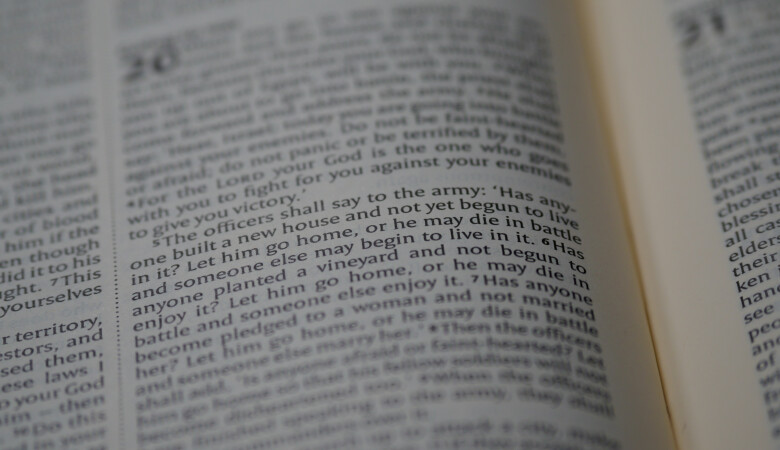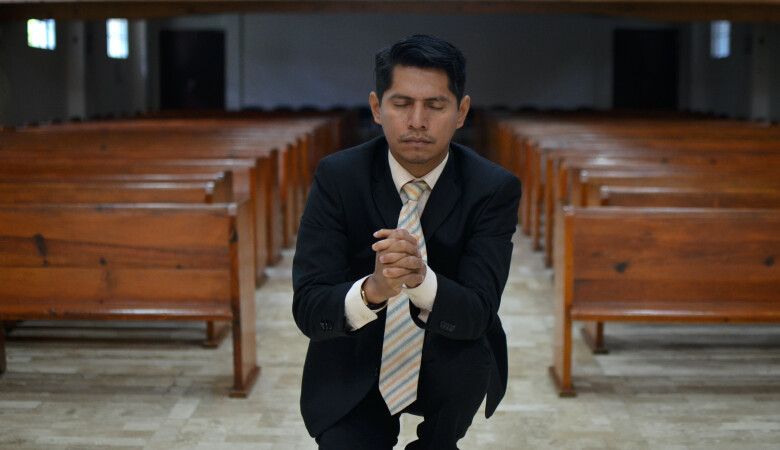Abraham's Stubborn Sin, God's Sovereign Grace
September 12, 2004 | Andy Davis
Genesis 20:1-18
sermon transcript
Introduction
Yesterday, in New York City, bells throughout the city tolled at four different times in commemoration of the terrorist attacks of September 11, 2001: One to signify the time at which the first plane hit the first tower, one at the time the second plane hit, one at the time when the first tower crumpled to the earth, and one at the time when the second tower collapsed.
As people gathered to commemorate what happened, to remember loved ones, to weep and pray and turn their hearts toward God, a question was perhaps in the minds of many: “Are we safer now than three years ago? Where do we find safety and security in a world that hates God?” Are we safer now? Many would answer no. Many will never look at the world the same again when boarding an airplane, or being in a crowded restaurant or a bus depot. A suspicion may lurk that they might be among the next victims of a spectacular terrorist attack. That feeling has been corroborated by the small world in which we live, in which things happen on the other side of the earth which we know about it the moment it happens. Terrorists have attacked commuter trains in Spain and viciously, a public school in Russia. We all saw the effects of that.
Are we safer now than we were three years ago? The central message of the September 11th Commission is that our nation was unprepared. In the wake of that commission report and on the brink of the presidential election, people are asking, “How can we be better prepared? What can we do about terrorism? How can we find security?” Perhaps the answer is more military systems or better trained anti-terrorist commandos. Perhaps we need a better worldwide system of intelligence gathering, especially in the Muslim world. Others would argue completely differently, that as a nation, our security lies in creating a better profile in the world and presenting a more generous and caring face, including better relationships with our Muslim neighbors.
People also debate whether the war in Iraq made us more or less safe. You pay your money at the beginning of that question before you enter into it — how in the world could we ever answer something that complex? Those that would oppose the war in Iraq say, “No, the situation has destabilized. Al-Qaeda and other groups are more able to recruit, and there is more animosity. Whereas if we had played the situation differently on September 12, 2001, and from then on, we would have world sympathy on our side. Others would say, “We had to remove Saddam Hussein. He was like a cancer.” And so the debate goes back and forth.
This has relevance to Genesis 20 because when Abraham came to that region, he looked around and said, “There is no fear of God in this place.” He was afraid, so he looked inward and dealt with it with his own resources. He lied and connived and schemed. He looked inward when he should have been looking upward at the Sovereign God. American Christians, you will not find your security in any of the things that I have mentioned, but in God alone, in trusting in Him alone. Because the real danger hanging over the human race is not a terrorist attack. It is eternal condemnation at the hand of a just God because of our sin. What can rescue us from that? God and God alone.
We find our security in Him, not in whatever commission comes after the September 11th Commission, or whatever schemes the American government makes or other governments in the world. No, we do not find security in that. We find it in Christ, and Abraham should have found it there too. He should have found his security in God, and in God alone.
Abraham, Sarah, and Abimelech: Stubborn Sin, Sovereign Grace
Abraham’s Stubborn Sin (vs. 1-2)
In Genesis 20, we come to another embarrassing moment in the history of the patriarch Abraham. This is not one of his best times. It is remarkable how we can go back and forth. Here we see the stubbornness of sin emerging again. Genesis 20:2 (ESV) says, “And Abraham said of Sarah his wife, ‘She is my sister.’ And Abimelech king of Gerar sent and took Sarah.”
The context is Abraham’s continued wandering from place to place. He lived in tents, as the Scripture says. He had no permanent dwelling place. He had the Promised Land, but it was not his yet, and so he had to move around. He left the Oaks at Mamre and went into this desert region in Gerar. Verse 13 says, “And when God caused me to wander from my father's house…” He was a wanderer, an alien and a stranger in this world, just as we are. You may own a home, but this is not your home. You are an alien and a stranger in this world. So Abraham wandered into this desert region.
I was in Greece this summer to speak and minister to missionaries working in Eastern Europe. One of the ministry groups that they target is gypsies. There are hundreds of thousands of gypsies in these Eastern European countries. You see them along the side of the road, in some places still in quaint horse-drawn carriages. They have no home, not welcome in any nation, shunned to some degree. Abraham was like that, drifting around from place to place, with no permanent home. As he came to Gerar, he looked around and determined, “There's no fear of God in this place.” He was concerned again about his wife Sarah. By this time, she was almost 90 years old. I wonder how good-looking she was at that point, but he was concerned about her, and so he thought, since there was no fear of God, he must do the same thing he had done before.
This is the second time. He did this in Genesis 12 while in Egypt, and he received difficulty there as a result. He was about to do it again. How stubborn is the stain of sin. How difficult it is to conquer the habit. AW Pink put it this way, “Sad indeed, inexpressibly sad, was Abraham’s conduct. It was not the fall of a young and inexperienced disciple, but the lapse of one who had long walked the path of faith that here shows himself ready to sacrifice the honor of his wife, and what is worse, to give up the one who was the focus of all God’s promises.” He was ready to trade all that in for personal security, for safety. We see how difficult it is to break habitual sin. Pink further said about this, “What made the matter so much worse in Abraham’s case was that it was not a question of being surprised into a sudden fault. It was the reoccurrence of an old sin. Long ago he had followed the same wicked course in Egypt and had been banished in disgrace.” It seems as though he learned nothing from that experience, so he did it again.
God’s Sovereign Restraint of Sin (vs. 3-7)
In Verses 3-7, we see God’s sovereign restraint of sin. God is active in the world restraining sin. The church is called to be salt in the world, and I look on that as a restraint against sin. Salt desiccates — it dries out the meat so corruption cannot spread so quickly through it. God is the ultimate salt in the earth, resisting the spread of evil. He is active all the time, blocking people’s evil intentions. We see in this text the interference of God, the activity of God in blocking sin so that it cannot happen. He gets involved. He says in verse 3, “But God came to Abimelech in a dream by night and said to him, ‘Behold, you are a dead man because of the woman whom you have taken, for she is a man’s wife.’” God rebukes Abimelech for his unwitting sin. It is amazing how strong God’s rebuke is. “You’re a dead man walking. It’s just a matter of time, Abimelech. You’re dead because of the woman that you have taken.”
Abimelech pleads innocence by reason of ignorance. Verses 4-5: “Now Abimelech had not approached her. So he said, ‘Lord, will you kill an innocent people? Did he not himself say to me, “She is my sister”? And she herself said, “He is my brother.” In the integrity of my heart and the innocence of my hands I have done this.’” This is Abimelech talking to God in a dream. He is pleading innocence, saying, “I didn’t know.” Not guilty by reason of ignorance. 1 John 3:21 says, “Dear friends, if our hearts do not condemn us, we have confidence before God.” That is the way it was with Abimelech. He said, “I didn’t do anything wrong.”
Ignorance greatly mitigates guilt. The less you know about God’s will and His commands, the less guilty you are. It does not remove it entirely — ignorance of the law is no excuse. He is guilty, but his ignorance mitigates his guilt greatly. We see also, however, God’s sovereignty in restraining the evil. Verse 6 says, “Then God said to him in the dream, ‘Yes, I know that you have done this in the integrity of your heart, and it was I who kept you from sinning against me. Therefore I did not let you touch her.’” Did you notice that? God said, “I will not let you do it. I kept you from sinning against Me; I did not let you touch her.”
God is very active in the world in restraining evil, not passive. He is not along for the ride in world history, just discovering the surprise of what is around the next bend. He is controlling events, and He interfered here with Abimelech. He stopped the situation before it unfolded. He told Abimelech what he had to do. There is a time when “I’m sorry” is not good enough. There must be restitution for the evil; something must change. He could not say, “I’m sorry, I didn’t know, but I’m gonna go ahead and take her.” He was a dead man if he continued forward. Verse 7 says, “Now then, return the man's wife, for he is a prophet, so that he will pray for you, and you shall live. But if you do not return her, know that you shall surely die, you, and all who are yours.” Your life is hanging in the balance and the only thing that will save you is to return the woman, and if he prays for you, then you will live. But if you do not return her, know that you shall surely die, you and all who are yours.
It is not just Abimelech's life hanging in the balance here. Other people will be affected by Abimelech’s next move. This is a great threat against Abimelech, a great danger.
Abimelech’s Righteous Rebuke, Abraham’s Feeble Excuse (vs. 8-13)
If you were Abimelech, what would you do? You would wake up and say, “Get Abraham in here, I need to talk to him.” He summoned all of his servants first. Verse 8 says, “So Abimelech rose early in the morning and called all his servants and told them all these things. And the men were very much afraid.” There was an intense urgency. First order of business was to deal with the situation. Then he called Abraham in verse 9: “Then Abimelech called Abraham in and said, ‘What have you done to us? How have I wronged you that you have brought such great guilt upon me and my kingdom? You have done things to me that should not be done.’” That is a rebuke, is it not?
Abraham was supposed to be a blessing to the Gentile nations. He was not supposed to bring a curse and death, but that was the very thing he brought to Gerar, the very thing Abimelech was facing. The ESV has a literal translation of verse 10: “And Abimelech said to Abraham, ‘What did you see, that you did this thing?’” In other words, “What did you see in me? I need to understand the way you perceived us.” In Verse 11-13, “Abraham replied, ‘I said to myself, “There is surely no fear of God in this place, and they will kill me because of my wife.”’”
We live in a world like that, not characterized by the fear of God. Terrorists who do the kind of evil things they do have no fear of God in their eyes. They have their own idolatrous view of God. They do not fear the true God. “There's no fear of God in this place,” said Abraham. He misjudged Abimelech by a country mile. Abimelech did fear God. All it took was a dream, and he was immediately zealous to do what was right. Abraham was wrong about Abimelech, he did fear God. Not only that, but Abraham faithlessly misjudged God’s sovereign power, the power that is available to keep him safe and protect him. He forgot about God, he forgot about his faith in God. He said, “They will kill me because of my wife.”
It is vital to understand that Sarah was not pregnant yet. She conceived Isaac in Genesis 21:1-2. So she was not with child yet. How in the world then could Abraham’s life be hanging in jeopardy? God had made a promise that through his seed all nations on earth would be blessed. So faithlessly he was not trusting in the God of the promise. In Chapter 22, he spectacularly trusted in the God of the promise — by then his faith had reached a high level, but here it was so weak.
Then he gave the humorous rationalization, “Besides, she really is my sister…” Would that really make things well between him and Abimelech? No, Abimelech was almost a dead man, and God was not impressed by Abraham’s technicality. “Besides, she really is my sister, the daughter of my father though not of my mother; and she became my wife.” Because Sarah was Abraham’s half sister, he was technically not lying. But the issue was that Abimelech was going to take her to be his wife. The fact that she was really Abraham’s sister is totally irrelevant in this case. He should have confessed. Also, the Lord covered this in His law. Leviticus 19:11 (ESV) says, “... You shall not deal falsely; you shall not lie to one another.” He conned Abimelech; he was a false dealer.
This was a deeply embedded pattern of unfaithfulness. He had made the commitment when he first began to wander from his father’s household: “And when God had me wander from my father’s household, I said to her, ‘This is how you can show your love to me: Everywhere we go, say of me, “He is my brother.”’” They had settled that many years earlier and it had been working ever since. It was a good con game. Every time he did that, he ended up richer; good things came to him every single time. He missed the point from Genesis 12. This was a deeply seated pattern, a commitment that he and Sarah made together. In doing so, they forgot about God — it was a fleshly commitment.
Abimelech was zealous in moving forward for restitution and vindication of Sarah. Abimelech fully obeyed God and immediately restored Sarah. He humbly asked Abraham to pray for his healing and the healing of his house. “For God had closed every womb in the house because of this offense.” Everybody was affected by what had happened. Abimelech fully restored each relationship and covered the offense by generosity. Grace brought about a happy ending.
Grace Brings a Happy Ending (vs. 14-18)
Verses 14-18 say, “Then Abimelech took sheep and oxen, and male servants and female servants, and gave them to Abraham, and returned Sarah his wife to him. And Abimelech said, ‘Behold, my land is before you; dwell where it pleases you.’ To Sarah he said, ‘Behold, I have given your brother a thousand pieces of silver. It is a sign of your innocence in the eyes of all who are with you, and before everyone you are vindicated.’ Then Abraham prayed to God, and God healed Abimelech, and also healed his wife and female slaves so that they bore children. For the LORD had closed all the wombs of the house of Abimelech because of Sarah, Abraham’s wife.”
Grace was at work covering a multitude of sins. First, God was gracious to Abimelech in bringing the illness to begin with. It is counterintuitive to think of it that way, but it was a gracious act of God to protect and prevent sin. The disease came into his house from the grace of God. God was gracious to Abimelech in warning him by means of a dream, rather than simply bringing judgment. God did not owe him a warning; He could have killed him without it, but He was gracious. He was also gracious in the timing of the warning, before any sin could occur. He timed it perfectly, interfering before the sin could be consummated. He was gracious in the mode and the message of the warning in the form of a mild and yet convicting dream. He was gracious in accepting Abimelech's explanation: “Yes, I know that you did it with clean hands.” He was gracious in telling Abimelech clearly what to do to make it right. Finally, he was gracious in hearing Abraham's prayer on behalf of Abimelech and his nation.
In turn, Abimelech was gracious to Abraham and Sarah. He could have had them executed, could have been furious with them, but instead he was gracious and was humbled to ask for prayer. He was also generous, giving a thousand pieces of silver and freedom to settle anywhere in the land. Abimelech was gracious to restore Sarah to her husband and to restore their dignity in the eyes of everyone. Abraham was gracious to Abimelech and that he prayed for him. But more than anything, God was gracious to Abraham. God protected His redemptive plan, intending soon for Sarah to conceive Isaac. As God was gracious to Abraham, he was gracious to all of us by beginning the redemptive plan through Israel in this way.
Timeless Lessons of God and Man
Lessons About Human Nature
We learn several lessons about God and man in this account. First, we learn about human nature. Entrenched sin patterns become incredibly stubborn. While in Japan, Christi and I made a comforter. It was a lot of work, but it is special to us. About four years ago, a little red pen stain got on it. We did not deal with it immediately; we may have eventually tried to clean it, but now it is a permanent part of the cloth. Not dealing with things immediately in terms of cleansing can leave lasting stains (though Christi can get most stains out). This is the way it is with sin — if it takes root in your behavior patterns, it is tough to eradicate.
The way I read the Genesis account, Abraham was at this minute innocent of all sin because of his faith in God. Abraham heard the promise, the word of God, and God credited to him as righteousness because of his faith. Genesis 15:6 says, “Abram believed the LORD, and he credited it to him as righteousness.” That means in terms of justification that in the judgment book of God, all of his sins had been erased, eradicated by the blood of Christ. In John 15:3, Jesus said to his disciples, “You are already clean because of the word I have spoken to you.” It is incredible for God, through Christ, to say all who have trusted in him are free of the guilt of sin, clean because of the word He spoke. But God removes the blot on his judgment book before He removes the blot in your character, and for the rest of your life, you battle the entrenched effects of bad decisions you made in the past. It is so hard to overturn character traits, as we see with Abraham.
We also see in this the way our sin affects other people, not only ourselves. Sarah lied as well. Soon Isaac would do the very same thing. Abimelech’s life hung in the balance. Abimelech’s family, his household, and in fact, his whole nation were affected by the sin. Sin is devastatingly expensive.
Third, we see the powerful effects of the fear of the Lord. The fear of the Lord is the beginning of wisdom. Because Abimelech feared the Lord, he zealously made it right before anything worse could happen.
Fourth, we notice the powerful effects of prayer. James 5:16 (NIV) says, “Therefore confess your sins to each other and pray for each other so that you may be healed. The prayer of a righteous man is powerful and effective.” That means some disease and sickness and infirmity are the direct result of sin. The wombs were closed up, a physical infirmity directly caused by sin. Do not misunderstand, do not make the mistake that Job’s friends made, that every time that there is an illness, there is a hidden secret sin. But sometimes there is. And when there is, James 5 says, the answer is effectual, fervent prayer of a righteous man and confession of the sin. Bring it up, deal with it so that you may be healed.
Lessons About God’s Sovereign Grace
We also learn about God’s sovereign grace. Our sovereign God has a sovereign plan, and He will not allow people’s sin to derail it. He gets involved. That is so encouraging, no matter how much it seems that earthly events are spinning out of control. It is grievous to read about terrorist attacks like the one in Russia, to see the pictures — they should bring us to tears. Yet God is sovereign, ruling still, able to stop things from happening. Do you put your trust in the Office of Homeland Security? They may be doing a good job with a hard task — how can we be protected against small terrorist cells who can kill eight people with a car bomb if they wanted to? How is Homeland Security that powerful? They are not. I put my trust in a God who is.
He is sovereign, and He is powerful. How many Al-Qaeda plots have been spoiled by circumstances? Let's win an Al-Qaeda operative to Christ and ask what has happened over the last 20 years, any circumstances that have interfered with any plans, intending to do something and then something happened to prevent it. They would testify of the times they saw this again and again. Is it not the hand of God in secret who is protecting, working, channeling the river of history for His purposes? Our God is sovereign.
I am glad he did interfere, because this encounter between Abraham and Abimelech could not have happened at a worse time. Suppose that Sarah had spent just one night with Abimelech, and then shortly thereafter became pregnant with Isaac. God’s specially crafted supernatural plan, the miracle baby, the child born in Abraham’s old age would forever have a big dark question mark over it. People would wonder if Sarah needed to get herself a man who could give her a son. There would be some questions, some whispering — the human heart is capable of that kind of questioning. God was crafting a wonder child, Isaac, the son of the promise, and there was no way he would allow Abimelech and Sarah to have even one night alone together. God interfered before any questions could darken the sovereign power of God. His redemptive plan had to be protected. In another situation, Isaiah 7:7 says, “Yet this is what the Sovereign LORD says: ‘It will not take place, it will not happen…’” Our God said “No, it will not happen.” Be glad that God interferes with sin, that in His sovereignty He does not let it happen. He says in verse 6, “That is why I did not let you touch her.” Truly, God is a sovereign king.
Five Connections with Christ
I will make five connections to the person of Christ. Old Testament accounts teaches us about human nature and about God, but we should also look for what we can learn about the person of Jesus Christ.
Christ’s Character Shines by Contrast
First, Christ’s character shines by contrast. Abraham is one of the great men of history and in the Bible. As proof, read Genesis 22 again, when God tested Abraham and said, “Take your son, your only son, Isaac, whom you love and sacrifice him.” You see his obedience and his faith and what a great man he was, but he was not a perfect sinless man. He was disqualified from being our redeemer. It was impossible for him to lay down his life because he was a sinner. But Jesus is absolutely sinless and perfect in every way. He never once told a lie, never once misled anybody, he told the truth to Pharisees, to tax collectors, to friends and enemies alike, and in the end, when his life was hanging in the balance, standing before the high priest, he told the truth about his divine nature. He stood before Pilate and told the truth again, and it got him killed. He was a truth teller. Absolutely flawless, unlike Abraham.
Christ’s Human Lineage
Second, Christ’s human lineage through Isaac was protected and enabled. God already made the promise that through Isaac Abraham’s offspring would be named. The genealogy in Matthew 1:1-2 says, “A record of the genealogy of Jesus Christ the son of David, the son of Abraham: Abraham was the father of Isaac…” God interfered and protected the earthly lineage of Jesus Christ.
Second Adam
Third, Christ was the second Adam, our only hope. Central to the idea of Abimelech’s plight is this concept of federal headship — a king represents his people, a father represents his household. God upholds this in the account. Verse 4 says, “Now Abimelech had not gone near her, so he said, ‘Lord, will you destroy an innocent nation?’” Abimelech was concerned about his whole nation.
In verse 7, God says, “Now then, return the man's wife, for he is a prophet, so that he will pray for you, and you shall live. But if you do not return her, know that you shall surely die, you, and all who are yours.” It was not only Abimelech who would die for Abimelech’s sin, but everybody who belonged to him. This is a strange idea to us Americans. We are individualistic. I stand or fall on my own two feet. Yes, I have done some wrong things, but I am the master of my fate, the captain of my soul. Why should I be held accountable for somebody else’s sins? When we come to a deep doctrine called original sin and find that Adam represented the whole human race of the tree, that is troubling to us. It does not seem fair. Adam stood in our place and represented us, and as a result of his sin, all of us die? Death entered the world through one man and in this way, death came to all men because all sinned in Adam? How can that be?
It is a strange corporate identity. We do not understand it. One of my children once complained, “It’s not fair, I wasn’t there when Adam sinned.” But neither were we there when they crucified our Lord. We were not there when Jesus died in our place. Just as Adam sinned for us all, so also Christ stood in the place of all of his people, all who would trust in Him and believe in Him. He is the second Adam. Federal headship, the idea of a single person representing all of us, is our only hope of salvation. Romans 5:19 says, “For just as through the disobedience of the one man the many were made sinners, so also through the obedience of the one man the many will be made righteous.” Jesus is our representative. He took our place on the cross; He died in our place. That is our only hope.
Christ as Prophet and Priest
Fourth, we see Christ as prophet and priest. Verse 7 contains the first mention of the word prophet in the Bible. “Now then, return the man's wife, for he is a prophet, so that he will pray for you, and you shall live.” We see the impact of the king, Abimelech, on his whole people. And we see Abraham conducting a priestly intercessory ministry, praying as a priest would. All three of these — prophet, priest and king — are fulfilled perfectly in Christ Jesus, the King of Kings, He is the final word of the prophet, and he is our great high priest who ministers for us.
Covering for the Eyes
Finally, we see Christ’s atonement as a covering for the eyes, the actual mechanism for atonement displayed in Abimelech’s restitution. Genesis 20:16 (KJV) says, “And unto Sarah he said, ‘Behold, I have given thy brother a thousand pieces of silver: behold, he is to thee a covering of the eyes…’” Atonement is literally a covering of the eyes. The eternal God never forgets anything, so how will he forget your sin? He puts the blood of Christ as a covering for His eyes, so that His eyes, pure and holy, can see only the shed blood of Christ when he looks at us. He interposes the blood of Jesus Christ between His holy eyes and our sin.
Alan Carlson told me a story about one of his Bible classes. The question was asked, Is there anything impossible for God? A little girl gave the answer, “Yes, it is impossible for God to see through the blood of Jesus and look at my sin.” Isn't that beautiful? I would like to know who that little girl was, deep in theology and strong in her faith. It is impossible, because God has made it impossible. It is impossible for him to see through the blood of Jesus to look at your sin.
Applications
Acknowledge Sin and Grieve
First, acknowledge the stubbornness of your own sin patterns. Realize you are fighting it too; you are no better than Abraham. He is like us, so acknowledge it and grieve over the amount that your sins have cost you and those around you.
Turn from Sin Now
Today, like Abimelech’s dream, if God is warning you to turn from sin, do it without delay. Why presume that God will give you any more time to turn from your sin? Abimelech did not have time. He had to do it first thing the next day or God would have put him to death.
Is Sin at the Root of Sickness?
If you, or somebody you know is struggling with a serious physical problem, disease or an ailment, do not assume that sin is not at the root of it — it may be. I am not saying it always is, but sometimes it is. Take the advice of James 5:16 (NIV): “Therefore confess your sins to each other and pray for each other so that you may be healed. The prayer of a righteous man is powerful and effective.”
Rest in God’s Sovereign Control
Do not rest in the Office of Homeland Security or in the winning of the next election, or in the occupation or the liberation of Iraq for your security, but rest in God and in God alone.
Rest in Christ’s Blood Alone
Finally, trust in the blood of Christ, and in His shed blood for you. He alone can protect you and save you from your ultimate danger, which is Hell.






























